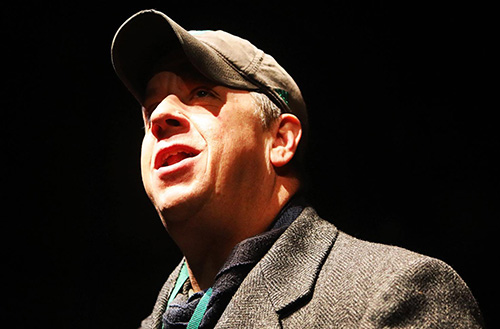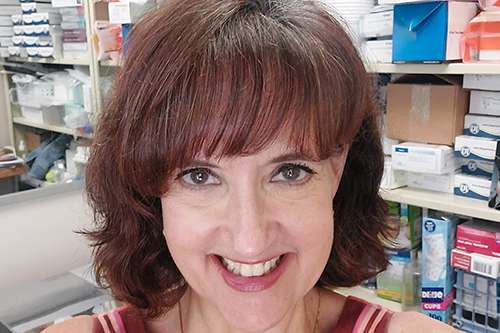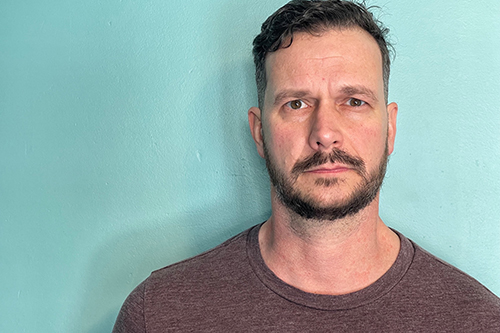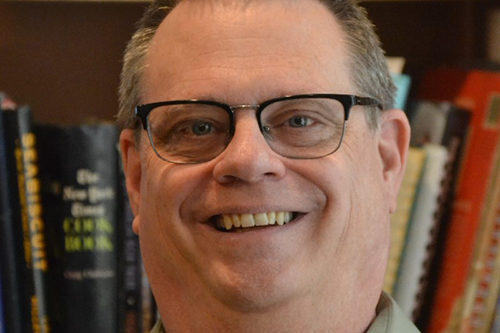Theatre Course Learning Outcomes
THEA 1080 - Introduction to Costuming
Upon completion of this course, the student should:
- Demonstrate familiarity with the fundamentals of the social/psychological aspects of why people wear clothing.
- Demonstrate an understanding of basic clothing shapes and their place in history.
- Demonstrate an understanding of what a costume designer does and how a costume shop works.
- Demonstrate a knowledge of clothing fibers and their uses in costuming.
- Explain how color affects character development.
- Articulate the role of the costume designer in the collaborative team of theatre productions.
- Demonstrate mastery of basic skills in hand and machine sewing.
- Correlate costume design to the literary, historical, and social/psychological aspects of the dramatic literature.
THEA 1090 - Introduction to Theatre
Upon completion of this course, the student should be able to:
- define and explain the contributions of the playwright, actor, director, designers, and technical theatre personnel.
- demonstrate an understanding of the collaborative nature of the theatre arts.
- demonstrate an understanding of a broad range of theatre terminology.
- demonstrate an understanding of how a theatrical production is “made”, and be able to critically evaluate the success of a theatrical production.
THEA 1120 - Stagecraft
Upon completion of this course, the student should be able to:
- Identify and use the tools, materials and equipment used in scenic production, including construction, painting and handling.
- Read and execute scenic plans and drawings.
- Research and determine means of acquiring production props.
- Understand the scenic design process.
THEA 1125 - Play Analysis for Production
At the completion of this course, the student should be able to:
- Identify and describe the 6 component parts of the dramatic form: plot, character, theme, diction, rhythm, and spectacle.
- Identify and describe the mechanics of plot structure: theme, exposition, conflict, complications, crisis, climax, and conclusion.
- Identify and describe the major forms of drama: tragedy, comedy, melodrama, farce, tragicomedy.
- Demonstrate their ability to write and speak clearly about dramatic literature, the requirements of production and the experience of performance.
- Conduct appropriate research on the play’s time period and articulate how it applies to the production process.
THEA 1126 – Diverse Voices in Contemporary Theatre
Upon completion of this course, the student should be able to:
- Identify and discuss the achievements of a number of prominent multicultural playwrights.
- Demonstrate an analytical grasp of the central concerns of the selected plays.
- Identify and discuss emerging themes across the range of plays, and the significance of those themes for all audiences.
- Demonstrate a critical and theatrical vocabulary for writing and speaking about these works and the human experiences they illuminate.
- Read, analyze, prepare and produce a public staged reading of selected scenes.
THEA 1130 - Origins of Theatre
Upon completion of this course, the student should be able to:
- Recognize the significant persons, events & theatrical movements that have provided the foundations for modern theatre.
- Recognize the various historical elements of drama, such as style & literary conventions.
- Identify the social themes & structures historically responsible for the development of dramatic types.
- Describe the varieties of writing & performance styles & production techniques that prevailed from ancient Greece to the Renaissance.
THEA 1140 - Acting I
Upon completion of this course the student should be able to:
- Conduct a group warm up containing vocal, physical and mental exercises.
- Prepare and present a number of well-polished performance assignments, including scenes with a partner and monologues.
- Demonstrate the ability to collaborate with classmates on classroom exercises and performances.
- Perform detailed script analysis, focusing on a deep understanding of character’s objectives, obstacles and tactics, and effectively communicate that understanding in performance.
- Utilize fundamental acting terminology and technique to solve acting challenges.
- Demonstrate the ability to accurately interpret and utilize written and verbal directions provided for performances.
- Apply feedback and criticism from previous performances toward improving and refining skills and techniques in subsequent performances.
- Provide constructive feedback to performances by classmates.
- Compose written criticism of live theatrical productions.
- Maintain a detailed journal of the theatrical process.
THEA 1150 - Theatre for Children
Upon completion of this course the student should;
- Develop a comprehension of the principles and terminology of the theatre.
- Develop an understanding of the uses of theatre in educational curriculum.
- Comprehend the development of children’s theatre through storytelling.
- Experience the process of producing a play for a young audience.
- Gain the knowledge to implement theatre games in the classroom.
THEA 1160 - Movement for Actors
Upon completion of this course the student should be able to:
- Assess their physical (movement) strengths and weaknesses in order to maximize their strengths and challenge the weaknesses.
- Create performances through observation and analysis from a wide variety of sources.
- Demonstrate communication and collaboration with other performers.
- Be able to compose creative pieces that demonstrate an understanding of the complexities of visual and oral aesthetics and the challenges associated with both.
THEA 1170 - Theatrical Make-Up
upon completion of this course the student should:
- Develop basic knowledge of facial anatomy and the chemicals components of cosmetics.
- Be able to use disparate sources (historical, faunal, botanical, etc.) as aids in their creativity.
- Demonstrate an understanding of the relationship between design and communication.
- Create their own design aesthetic.
THEA 1180 - Stage Lighting & Sound Production
Upon completion of this course the student should be able to:
- Identify and use the tools, materials and instruments used in stage lighting.
- Read and execute a light plot and associated paper work.
- Identify and use the tools, materials and equipment used in sound production.
- Read & execute a sound plot.
- Know the duties and apply procedures of the stage manager.
THEA 1470 - Dance II Jazz and Tap
Upon completion of this course, students should be able to:
- Perform the fundamental exercises of elementary jazz technique including floor stretch and centrework combinations.
- Use and understand the traditional vocabulary, positions and steps in the elementary jazz and tap syllabus.
- Demonstrate an understanding of the progression and purpose of the specific order of individual classroom exercises.
- Summarize the historical and cultural development of jazz dance and tap dance.
- Demonstrate Increased body awareness and confidence.
- Apply the spatial concepts of proper alignment, placement, weight distribution, and isolation in all activities.
- Demonstrate a connection between various types of music used in class and understandings of rhythm, space and time expressed through dance.
THEA 1480 - Dance I
Upon completion of this course, students should be able to:
- Demonstrate an understanding of dance in general and ballet, modern and jazz specifically.
- Use space efficiently and adopt body movements to the stage play.
- Perform ballet techniques and basic foot and arm positions.
- Articulate how the three basic dance forms are dependent on each other and how Ballet, Modern and Jazz differ.
- Demonstrate an understanding of the interaction of dance with theater and everyday facets of the world around us.
THEA 2140 - Acting II
Upon completion of this course the student should be able to:
- Demonstrate proficient use of the fundamental principles of stage acting as learned in Acting I.
- Develop a personal approach to Acting, utilizing a variety of recognized techniques.
- Apply the experience of participating in a variety of theatre exercises, games, and improvisational techniques and the skills practiced and developed therein to the preparation of scripted scenes.
- Analyze a play script in a thorough, systematic manner.
- Demonstrate the personal discipline, conscientious effort, and professional attitude that the craft of acting demands.
- Prepare and present a package of two contrasting monologues for professional audition.
THEA 2145 - Acting for the Camera
Upon completion of this course the student will be able to:
- Demonstrate the differences between stage and film acting
- Implement and evaluate single-camera acting techniques for film and television
- Recognize and define on-set terminology and vocabulary
- Prepare for on-camera auditioning
- Recognize industry standards for resume, headshots, self-submissions and other promotional pieces
- List and locate casting breakdowns, union affiliations, and representation
THEA 2200 - Theatre Graphics
Upon completion of this course the student should be able to:
- Analyze the script for dramatic and visual content.
- Research for historical and dramatic accuracy of visual elements.
- Draw thumbnail sketches to develop a design based on the script and pertinent research.
- Exhibit advanced drafting techniques based on USITT graphic standards learned in Stagecraft and AutoCAD Basic and how to apply those skills to the design process.
- Use watercolor and model building techniques needed to develop a design.




